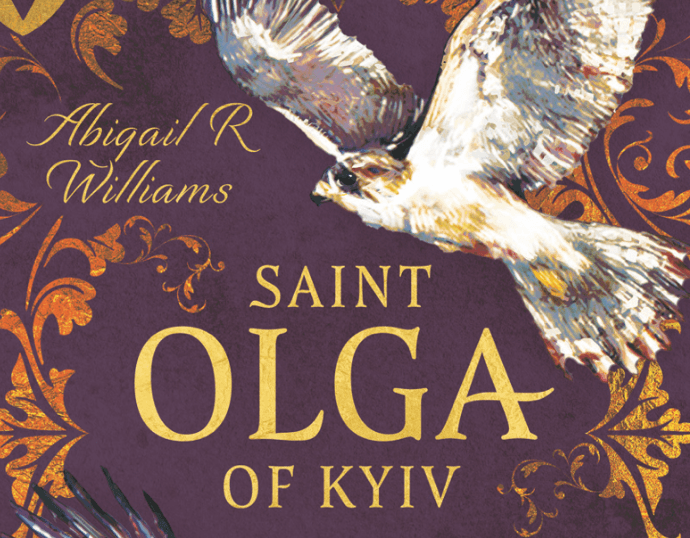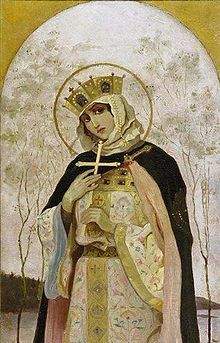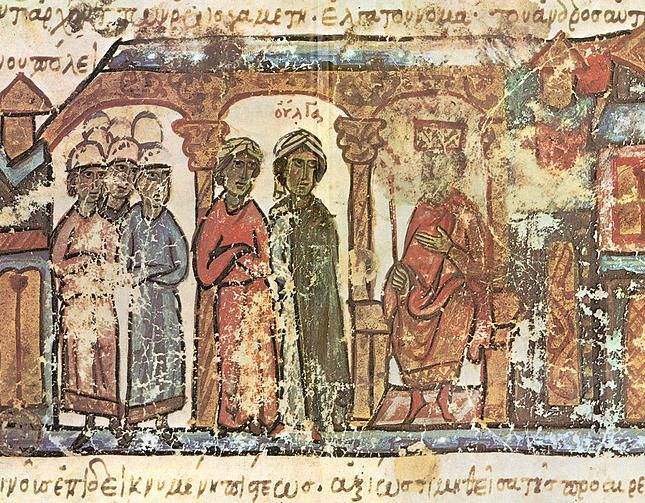Saint Olga of Kyiv: The Viking Queen
“
“For she [Grand Princess Olga] shone like the moon by night, and as was radiant among the infidels like a pearl in the mire”
– The Tale of Bygone Years
In 2022, I signed a publishing contract with Pen and Sword to write my debut book, Saint Olga of Kyiv: The Viking Queen, set for release in early 2026. This project has been a deep, multi-year endeavour involving extensive historical research, cultural analysis and insight, and translation work to bring Saint Olga’s remarkable story to life. About to move into the editing stages, I have been developing additional copy and content to help frame the manuscript: Author Bio, Preface, Blurb, Back pages. With publication on the horizon, I’m now shifting focus to the marketing phase— currently building a strategic social media campaign and crafting compelling copy to introduce Saint Olga of Kyiv to readers around the world.
01— The Creative Process behind Saint Olga of Kyiv (A case study)
0Cultral Insight 0Translation oBody Writing oAcadmic Writing oHistorical Research oFact Checking
Writing my debut novel was not just an act of storytelling, of creating a compelling narrative that would immerse the general history enthusiast: It was a journey through language, culture, and contested history, scouring through hundreds of published works to find even a slight mention of Olga, and translating the predominantly Russian source matter that discusses her more prolifically.
This project demanded a deep, nuanced understanding of Russian and East Slavic history, allowing me to move beyond the simplified and often mythologised mainstream Western portrayals of Olga. I spent years unpicking entrenched narratives in both academic literature and public discourse, carefully reconstructing a more complex portrait of a woman whose legacy has been co-opted by varying ideologies across time. To bring the life of Saint Olga to the page, I found myself not only navigating the linguistic nuances that so often shape—and sometimes distort—historical memory, but also the religious and cultural nuances that until now have defined Olga.
Balancing the demands of rigorous scholarship with the art of accessible storytelling, I have crafted long-form content that bridges the gap between academic and popular history. The result is a narrative that is richly researched and intellectually grounded, yet engaging and resonant for a wider readership. This work is an attempt not only to recount Olga’s story but to reframe how we think about early medieval power, gender, and religious identity in the East and to recenter Olga within her own narrative.
A pool so tranquil, it was as if Freyja were to join us at any moment
The cacophony of a waterfall drowns out the world and draws focus to the boulders and a flowing pool of water of Olga's Bath.
A fiery inferno as devastating as Olga's fury?
A controlled fire as devastating as the flames that consumed the Black Banya of Kyiv and all its inhabitants.
Bundled up in the library today. My hands may be frozen but at least I can identify with the cold that surrounded Olga's kin.
The University of Nottingham, buried beneath a breath of winter, where I was wrapped up in the library researching Olga.
The working title of my Debut Book and the canal I get to call my office (for today at least)
Working on my manuscript on the road, with my feet in the pools that inspired chapters, and canals that promoted creativity.
02 — Ghostwriting: Author Bio
Abigail R Williams is a young historian with a passion for exploring the intersections of language, culture, and history. Having graduated from the University of Nottingham with a Joint Honours degree in Russian Language and History, Abigail has fostered a deep academic understanding of the medieval Rus and engaged in religious studies that have fuelled a lifelong fascination with the region’s history and culture. Having visited Russia for both study and exploration, she has developed a particular fondness for Saint Petersburg, where she spent much of 2019 wandering the halls of the Winter Palace; people watching and reading in little nooks within Catherine the Great’s extensive portrait galleries. A firm believer that no visit to Russia is complete without trying Medovik, Abigail is always eager to share her passion for Eastern European history and culture.
03 — Body Writing: Blurb
Curious for a sneak peek into Saint Olga of Kyiv: The Viking Queen? Request exclusive sample excerpts here:
Widowed and faced with marrying her husband’s murderer, Grand Princess Olga had to make a choice: submit to tradition or defy it. Olga chose vengeance. Her retribution: legendary.
Olga was neither born into the ruling dynasty of Kyivan Rus — whose legacy shaped contemporary Belarus, Ukraine, and Russia, nor was there precedent for female leadership. Yet Olga wielded its power as if by birthright: she wasn’t simply a harbinger of vengeance; her strategic foresight was a masterclass in governance. Behind Olga’s charm and cunning was a shrewd political leader who resisted foreign threats with unwavering and bloodthirsty resolve. Olga was a force of female agency who defied patriarchal norms - she may be the mother of Slavic Christianity, champion of Orthodoxy, and Saint Equal to the Apostles, but her path to sainthood was anything but holy.
Drawing upon rigorous research and vivid storytelling, Saint Olga of Kyiv re-examines the life of this overlooked Regent-Queen, highlighting her incredible journey from vengeful widow, determined to secure the sovereignty of her son's future, to becoming the catalyst for the birth of Christianity in the Slavic world. This compelling narrative unearths the life of the often-forgotten Regent-Queen of the Rus, the rise of a ruler, the evolution of a legend, and a murderous legacy so remarkable that the world of the Slavs would forever be changed.
04 — Body Writing: Preface
As a graduate of the University of Nottingham with a degree in Russian Language and History, I studied the Rus under the guidance of Dr. Monica White. My academic journey introduced me to a wealth of fascinating topics, yet some areas of profound interest remained largely unexplored. Looking back, I like to tell myself that time constraints during my degree limited my ability to delve deeper. However, I suspect that, had I pursued Olga with the intensity I now bring to this book, I would have risked neglecting all my assessments, my dissertation, and perhaps even my timely graduation.
St. Olga of Kyiv first appeared on my academic radar during an early module on the formation of the Rus. She immediately struck me as a figure of immense complexity and significance. Her role in shaping the political landscape of the Rus (transforming it into a kingdom both feared and respected) is foundational. Yet, Olga’s legacy is often reduced to her baptism and subsequent sainthood, overshadowing her earlier, equally remarkable, contributions.
What captivates me most about Olga is her duality. She is saintly and murderous, Christian and Pagan, rational and extreme. This multifaceted woman is often flattened into a one-dimensional figure, remembered in fragments rather than as an extraordinary whole.
With this book, I aim to restore Olga’s complexity and vibrancy. I hope to give her the space to exist in her entirety: a towering figure of the medieval period who defies simple categorisation. Olga was not just a saint or a ruler, but a woman who wielded power in a world that demanded cunning, resilience, and, at times, brutality. This is the Olga I wish to bring to life. A woman of enduring significance whose duality makes her story as compelling now as it was in her own time.
05 — Body Writing: Back Pages
The first female ruler of Rus: Grand-princess Olga forged the path for an entire Dynasty.
Her revenge against the Derevlians is an infamous tale of the medieval world, and the Siege of Iskorosten showcased her mastery of psychological warfare. Olga’s rule shaped Eastern Europe, championing Christianity and ushering in an era of reform that laid the groundwork for the rise of the Rus, shaping history as we know it today.
Saint Olga of Kyiv was a powerhouse of political ambition and military execution. She has long sat in the shadow of her religious legacy, but she no longer sits within the shadow of herself.


